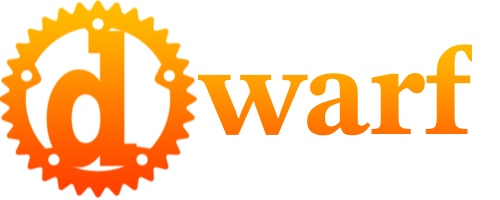
Introduction
🚧 This is book is a work in progress. 🚧
Welcome! This brief introduction will outline the status of dwarf, and set the stage for what's to come.
Before I get started, I need to state this this is the result of me hacking since April 2023.
As I write this that is about seven month and 80k lines of code ago.
So there is a lot of code, in a relatively short period of time.
Some of it is sloppy.
Some of it very much so.
But it's as correct as I can make it: "in rustc we trust", and praise be unto Henry and Milner for.
The one thing that it's almost guaranteed not to be is efficient.
I'm sure that I'm copying memory unnecessarily all over the place.
There are other areas ripe for critique, and I appreciate any and all feedback.
I appreciate anyone taking the time to bother to read the code to be honest.
In fact the code is sprinkled with notes to myself, and `// 🚧`` markers. The simple fact is that you can do it right, or do it quickly, and leave yourself as much context as possible.
Hello World
Every language deserves one, so let's get it out of the way. Go ahead and click the run button in the top right corner of the code-box below.
fn main() { let name = "World"; print("Hello " + name + "!"); }
Feel free to edit the code — replace World with your name maybe?
I know you want to. 😀
A brief story of dwarf
Caveat Emptor, Note Bene, etcetera
dwarf (the language and it's implementation, ChaCha) is very much a work in progress. The language itself is still evolving, and the implementation is still very much in flux. I don't honestly see very many breaking changes moving forward, however I can't promise anything until 1.0.
Dwarf started life as a DSL for another project. I've had so much fun with it, I want to see if anyone else might find it generally useful.
Because dwarf was intended as a DSL, the focus was not language design. I'm pretty sure if I had allowed myself that freedom that I'd still be working on it. And it would be weird...
So I based it on Rust. It shares most of it's syntax with Rust, while mostly maintaining the behavior of other interpreted languages. The one big exception is that dwarf is typed, like Rust.
That said, there is a lot missing. Traits for example are not to be found. Neither are there generics, or iterator adaptors. Enums are also a glaring absence. Some of these are missing only because I wanted to get this out the door. Others, like traits, may not have a place, and they may. It's all very unclear at this point, and will likely depend on demand. Other's, and those of my needs.
Right now dwarf is also very slow. (He's still working on his tunneling gear apparently.) It's slow because it's interpreted, and the foundations of the interpreter are not really built for speed. That said, there is a VM currently in the works, and it's already integrated with the interpreter to speed some things up.
Along the way I wrote a "debugger" and a REPL. The debugger is very basic. You have to set debugger statements in your code to get it to stop — there is no way to set a breakpoint form the tool. Once the program has stopped single stepping through the code is possible. There is also a "run" button to start it going again.
I began work on a DAP for VSCode (and others), but the documentation on the wire protocol is not easy to find. I put this on the shelf in favor of just publishing something a little more polished.
The REPL is really nice for playing around with the language. It's also a great way to prototype ideas.
So, thanks for taking a look, I hope you enjoy what you find!
A note regarding the code in this book:
The code snippets contained herein are executed by AWS Lambda. I've mentioned elsewhere that the interpreter is not fast. Running as a lambda, it's even not faster... er, slower. 😎